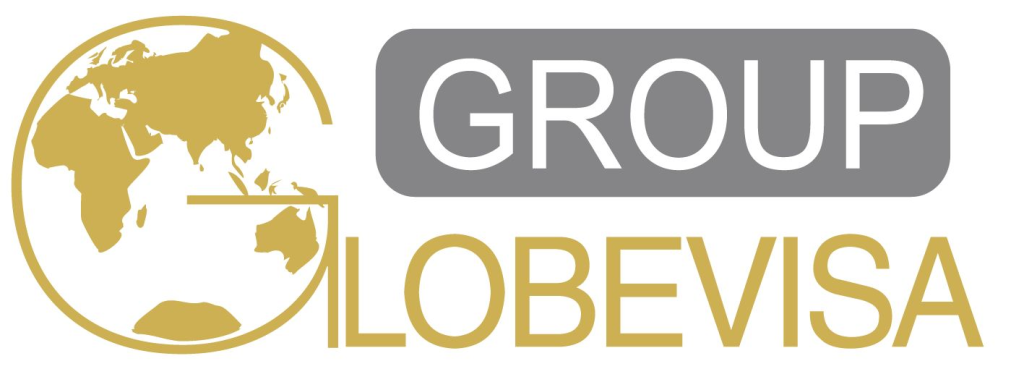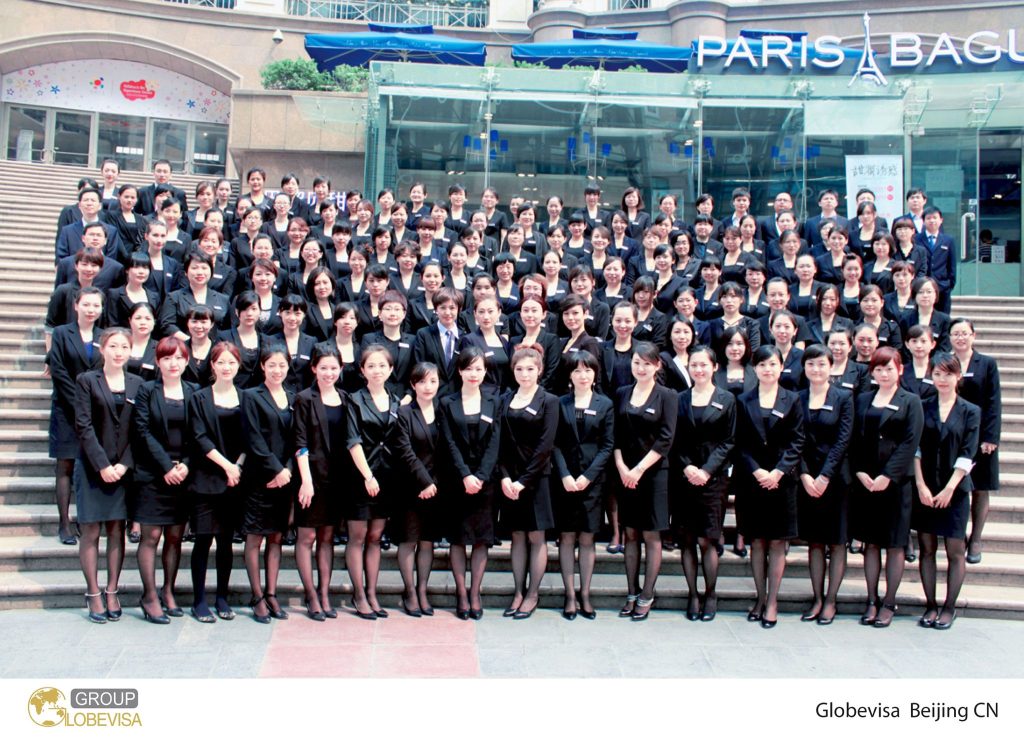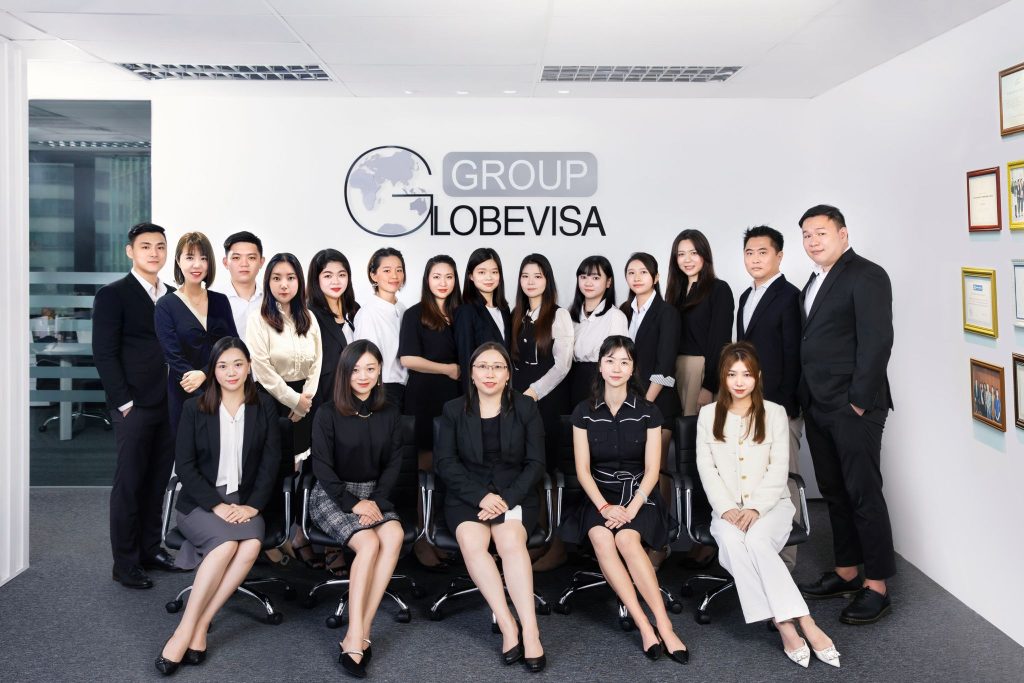The Man Who Runs The World’s Largest RCBI Firm: A Study in Meritocratic, Systemic Management

Globevisa Group
Sponsor
Henry, tell us about yourself.
I am 46 years old and have been in the industry for 24 years. After graduating from college at the age of 22, I entered the industry and started my business in the fourth year after graduation. I never worked in another industry ever since.
Why did you enter the industry in the first place? What made you decide to start a business on your own?
Well, I got into this industry because the first job offer I received by then was from an immigration company. The reason for starting a business was quite embarrassing: After I worked for three years, my employer’s company went out of business, and I lost my job suddenly. To make ends meet, I thought it best to do what I was familiar with, so I decided to start a business.
Can you tell us a little bit about Globevisa?
In 2002, three years after graduation, my partner Melvin Sun and I started a business together. Initially in Beijing, China. Four years later, we slowly expanded to other cities in mainland China.
In 2013, we set up our first firm in Hong Kong, then moved our headquarters to Singapore and gradually entered the international market. As of today, Globevisa has 19 offices in mainland China and seven in Southeast Asia, including two in Hong Kong, one each in Taiwan, Vietnam, Singapore, Malaysia, and Thailand. In South Asia, we have offices in Bengaluru, India. In the Middle East, we have firms in Dubai and Istanbul. There are five in Europe: Greece, Portugal, Cyprus, Spain, and the United Kingdom. Apart from those we also have offices in Vancouver and Brisbane. At present, there are 36 offices in total.
The number of employees is about 800, and we have served clients from 96 countries and regions.
Last year, we served more than 8,000 clients, a number that grows consistently.
How is Globevisa different from its peers?
Globevisa is a unique company, and our characteristics are reflected in the following three points:
#1: The largest client volume: Because Globevisa focuses on the field of immigration, the number of clients we serve is huge and ranks first in the world by a wide margin. The fact that Globevisa has the most experience and the largest volume of clients ensures that we can find the best project providers in all fields, as the best project operators in the world are willing to work with Globevisa.
#2: The multi-program parallel operative system: This is unique in the immigration industry. I have seen peers who are operating 20 programs at best. Globevisa currently offers nearly 300 programs in more than 40 countries including not only the traditional programs in the US, Canada, Australia, and New Zealand, but also all programs in Europe, Japan, South Korea, Southeast Asia, and Latin America.
We offer a full product line for one single country. For example, we offer different investment options for the Golden Visa program for real estate and funds. Meanwhile, we also provide service for the D2, D7, and Nomad visa programs in Portugal.
For Canada, we have up to 15 programs. This multi-program system allows Globevisa to provide clients with the widest range of options, and we can really do just that: Provide clients with the right immigration program that suits them most, since we are not limited to a few lucrative options.
#3: Global presence: After acquiring the biggest market share in mainland China, Globevisa sailed off to the global market, with 17 international offices now, a number we expect to reach 20 by the end of this year. This gives Globevisa a golden opportunity to provide a global perspective to our clients while performing local services.
What do you think are the extrinsic and intrinsic reasons for Globevisa's achievements?
This question is more difficult to answer. I think we have a good head start because China has always been the largest immigration market in the world. We started from China, which is already the biggest advantage.
When it comes to intrinsic strengths, I think there are a few.
#1: Compliance: After more than 20 years in this industry, we have never had much negative or devastating issues. Because from the beginning of the business, we really paid attention to compliance. For so many years, we witnessed a lot. Globevisa was never one of those companies that had sudden, meteoric growth. We just had gradual, steady development. You will find that Globevisa has expanded by 1-2 offices a year, year after year.
#2: High referral rate: During the decision-making process in Globevisa, we always put our clients’ needs first. For example, our multi-program system may not be the best way to earn money, but our aim is to provide clients with the best choice, not the most expensive choice. To achieve this, we must operate many program departments. Our clients can feel our sincerity during the interaction. As a result, we have high client satisfaction, which leads to a high referral rate. At present, 70% of Globevisa's new clients are from client referrals, which is also one of the highest ratios in the industry.
#3: Globevisa's internal management system: This is both digitally-driven and policy-guided. All institutional decisions are made by various committees. We have a Group Policy Committee, a Program Development Committee, a Dispute Committee, an Internal Compliance Committee, and a Competition Committee. All committees operate under Robert's Rules of Order: All managerial positions are chosen through open internal competition. In addition, information sharing within our Group is also borderless: All supervisors are required to write daily blogs, and everyone in our Group has access to these blogs. They can make their comments on the blog as well. Our management methods and tools are also significantly different from our peers.
Globevisa's internal management system

Can you share more about the competition mechanism you mentioned?
All management positions within Globevisa are open to competition, and the process is simple. It is necessary to publish the job requirements and make sure everyone knows them. Anyone can sign up for the competition, and we will broadcast the competition live so that everyone can watch.
We also provide a recording after the competition. There will generally be three people to form a panel. The participants will give a speech, answer questions from the panel, and finally, the panel will vote to select the winner. All managerial positions have a term of office, usually two to three years, after which the position must be released for competition.
That is, you do not have any right to appoint personnel?
No. This is our Group Policy, and all management positions must undergo this procedure.
What if the original manager does not make it?
Find another opportunity within the Group. If he/she cannot compete for other managerial positions, they can also try to find the program department to work as an associate position. No position at Globevisa is "tenured."
The concept of writing blogs is also interesting. Do you write one yourself?
Yes, I write it every day. Although everyone in our Group has access to my blog, I observe that half of the people who actually read it, which is about four hundred people, of whom about forty will interact with my comments.
What is the difference between such a blog and the work reports of other companies?
The difference is simple. In most companies, work reports can only be seen by superiors while, at Globevisa, blogs can be seen by the whole group, which avoids the phenomenon that management is only responsible to superiors.
What is the general content of your blog?
It's usually about my daily work, such as who I met, what the meeting was about, and what I thought after the meeting. It's about who to talk to and what I thought after talking to them. Simply put, it is to tell everyone what I did and learned during the eight hours of work that day, and I shared it with everyone. Sometimes I also share my views on the industry and my predictions, and what we can do about it.
It's time-consuming, right? Why do you do it?
Information sharing. Although it is time-consuming to write this way, the information spreads quickly, and all my report lines will read it and know my current focus. My understanding of management is simple: Management is about improving yourself and sharing information. Blogs help me spread the word and to share my little boost every day. This saves me a lot of time and energy in my management meetings.
How many direct reporting lines do you have? How do you manage the reporting line?
I have about 30 direct reporting lines. I manage the reporting line roughly through the following paths.
- My blog and the comments on each other's blogs come for management purposes. At the same time, we also have weekly and monthly text summary reports, which are also used to achieve the purpose of communication management through comments.
- Every week I set aside one day on my calendar (most of the time, it's not fully booked) for people to book meetings with me. All the meetings can be attended by other audiences, and I will also record the meeting for all the report lines to share.
- We use Amazon's 6-pager method. The duration of the meeting is also short, usually thirty minutes, an hour at most. Documentation and videos are backed up and shared publicly with other reporting lines.
- Because information is extremely open and fluid, such as daily blogs, weekly and monthly reports, and various meetings, most reporting lines communicate with me only once a month, but we manage to keep it up.
Why is Globevisa moving towards collective decision-making and digital-driven management?
When we first started Globevisa, my partner and I aimed to create a scalable business instead of a family business. So we made two decisions very early on: The first is that all of our relatives and friends are not allowed to work at Globevisa. The second is that our management must take the route of collective decision-making. The good thing is that collective decision-making requires more objective data. Globevisa's data analysis capabilities have improved accordingly.
How does Globevisa make decisions collectively?
We make decisions through committees. Many committees were set up, all of which are running according to Robert's Rule of Order. For example, we have a Group Policy Committee, which usually meets every three weeks. Each committee has six members, and the motion needs to be seconded before it can be discussed. There is a moderator to ensure each member can only speak twice. No speech can exceed two minutes, and then we vote. Only four votes are in favor can the motion be adopted. Our other committees, such as those for Program Development, Compliance, Disputes, etc., operate in the same way. We treat it seriously.
Many companies have similar policy committees but, in reality, everyone has to listen to the boss in the end. How does Globevisa avoid this?
This is actually related to our corporate culture, and the most important part of Globevisa's corporate culture is open communication, which took us many years. Now, the results are undeniable. For example, in the Competition Committee, statistics showed that when I was a member of the panel, my choice only had a 60% probability of success; that is, 40% of the time, the final votes for my candidates were inconsistent with those of the others, and this was still the result of voting after the debate of the three-panel members. It is easy to see from this result that Globevisa's committee is certainly not just a formality.
What is the so-called "digital drive"?
First, we created a "turnover coefficient," which is calculated based on various factors such as the success rate of each program, profit, taxes, etc. Our internal ERP system generates the success rate of each program. This coefficient is then used to determine the headcounts of departments. Even the size of the office for the consulting department is determined by the coefficient.
If the coefficient is too small, they will have to move to a smaller office or even a shared office. If it is so low that it cannot justify the renting of an office, according to our Group Policy, they will work remotely.
This mechanism reduces management costs, and there is no need to spend time arguing about how many people are needed in each department because the coefficient already determines the matter.
Multi-program mechanism
Why is Globevisa moving towards a multi-program mechanism? What leads you to this?
This is also a situation we have gradually arrived at. In the beginning, Globevisa started in the industry focusing on Canadian programs. When we reached about 30% of the market share in Canadian investment immigration, I had yet to realize the benefits of a multi-program operation. It wasn't until the shutting down of the Canadian federal investor immigrant program that we were forced to switch to other programs, and many other Canadian programs were developed at that time, as well as programs in Australia, New Zealand, and Singapore.
I found that there were benefits to this diversification; different clients had different needs. Previously, when we only focused on Canada, all our clients were guided to Canada by investment. Now that we have more programs, we can provide more options to our clients, so we have more deals and customer satisfaction.
Then I felt that since more than a dozen programs in four countries were opened, why not more? Then I embarked on the road of developing global programs, and kept doing that until today, when we offer nearly 300 programs.
This mechanism has benefited Globevisa so much that we call it the "Supermarket Model". With so many programs, we can recommend the most suitable ones according to clients' needs, and clients can experience all programs in one stop when they come to Globevisa, which suddenly forms a huge competitive advantage.
For example, for a Vietnamese client who wants to immigrate for the sake of her children's education, our competitors may recommend a Caribbean passport or a Portuguese Golden Visa.
What does Globevisa offer? The United States, Canada, Australia, and New Zealand are naturally okay. If you want an English-speaking environment, Cyprus, Malta, and Ireland can be the places for you, not to mention the United Kingdom. There are also programs in Asia, such as Korean investment immigration, because Jeju Island in South Korea has an excellent international school region. Singapore, Thailand, and Hong Kong can also be on the radar, as English education in these areas is very good. For this type of client, the advantages of Globevisa are reflected at once because it provides them with the most ideas, giving clients more choices and, naturally, making them more satisfied.

How do so many program departments work?
We set up a special program department to manage each program.
Simply put, we select a program manager through competition for each program, and then determine the number of people who will need to be prepared for this program through the "turnover coefficient". The program department is responsible for all the work of the program, including marketing, training, legal service, hosting service, and so on.
So, Globevisa has hundreds of program departments?
No. Some similar programs will be combined into one program department, so there are about 40 program departments across the Group.
How do you maintain the competitiveness of the program departments?
We have a long-term effort to establish the program department in the country where the program is located and the country where the potential client is located. For example, my colleagues in the Portugal program department are mainly in Portugal and China. Portugal is the place to provide legal and hosting services, so there we have in-house lawyers and partner law firms, while our colleagues in China mainly provide consulting support services to clients in China. In this way, we build the strongest professional service system.
Because each program manager has to re-compete every two years, a market mechanism is formed, and the best program manager will compete for the best program. The unqualified program manager will not be chosen again, and the market competition mechanism will be used to solve the problem of continuous competitiveness.
Why is this a rare practice in the industry?
I think this is related to the characteristics of the industry. Most of the industry is family-owned or in the form of law firms. Globevisa is a company that has been managed by a system (rather than a family) since the beginning, which is why it is in a position to coordinate and operate so many program departments. The work between the program department and the various consulting firms must also be integrated with management to be seamlessly connected.
Globevisa's Internationalization
What is the purpose of Globevisa's internationalization?
In terms of programs, to cover all immigration programs in the world, the income of a single program should not exceed 20%. Regarding client groups, it must also cover the world, and the number of immigrants in a single country should not exceed 1/3.
This is the internationalization standard I define for Globevisa.
Why is Globevisa going global?
Simply put, for long-term survival.
What if the policy suddenly shuts down if we only have one program? No one can predict that. Similarly, if our clients are only from one country, they will be affected by various geopolitical events, which in turn would make our business model vulnerable. Our consideration is as simple as that, just for long-term survival.
What are the benefits of Globevisa's internationalization?
In my opinion, there are mainly three advantages:
- The most complete program structure. No enterprise in the world can reach this volume of high-quality program databases.
- Institutionalized management is very easy to scale up. There is nothing that is not suitable for local culture.
- We have always attached great importance to compliance work, so we've managed to have a good start in different countries and regions.
What is the current progress of internationalization?
At present, we already have 17 branches in mainland China. A lot of branches have made very good progress in the short term. For example, the Turkish office, which was only established in December 2022, achieved the top position in the Group on the sales performance of Greek Golden Visa last month. The Vietnamese office was only established eight months ago, and I think it has already formed the best team in Southeast Asia, and the performance is also very competitive. Most of them are formed with local partners so that they can share the advantages of Globevisa's system and the partner's local marketing knowledge.
You often mention partners. How does Globevisa find partners?
Most of our partners are practitioners with relevant industry experience, and many are lawyers. Simply put, in a given country area, we want to find the best people as partners, and the definition of “best” is:
- passion for the immigration industry;
- familiarity with the local market and good connections;
- long-term thinkers who value compliance;
- accepting of Globevisa's culture.

Are you still looking for partners?
Yes. We have a long list and are actively seeking partners in the Philippines, Cambodia, and Thailand, as well as in South Africa, Nigeria, Egypt, Iran, Saudi Arabia, elsewhere in the Middle East, Eastern Europe, and Latin America.
What about the choice of the project provider?
The best. The standard is simple. Globevisa must be working with the best project operators in the world.
Did Globevisa have any difficulties or even failures during the process of internationalization?
That's too much. One of the biggest lessons is that, in the early days, we tried to manage the non-Chinese market in a Chinese way, which was a very painful and stupid mistake.
In fact, we have entered the Indian market and the Vietnamese market for the second time. We entered these two markets around 2016, but we didn't do a good job, and then we withdrew from this market because we didn't have a local operation, as mentioned above. This lesson was painful, but we learned it completely, and now all local companies are managed locally.
What are the short-term, mid-term, and long-term development goals of Globevisa's internationalization?
The short-term goal is to become the number one in market share in Southeast Asia, and coupled with its already top position in China, it will further consolidate Globevisa's global leading role.
The mid-term goal is to establish the Globevisa brand as the best brand in the immigration industry.
The long-term goal is to build Globevisa into the immigration industry as respected as Fragomen is at corporation relocation.
This is the first time you have raised the name of a peer, Fragomen. Why them?
Because Fragomen's status in the corporate relocation industry is very high, and it has also achieved a global presence. The firm has improved the social status of immigration lawyers in the United States. These achievements are beyond the reach of Globevsia, so it is necessary to learn from them.
Does Globevisa have any ideas for future diversification?
No. Because my partner and I really love the immigration industry. We feel that this industry can truly help people in need and change the course of many people's lives, and this is my greatest passion.
This year, I participated in the 7-7-7 island-hopping marathon in Taiwan, running seven full marathons on seven islands in seven days, and met many runners who love marathons, some of whom are over 70 years old. The enthusiasm of these people deeply touched me, and I also realized that I have far more enthusiasm for immigration than I have for marathons, and this realization has made me more sure of what I want.
Is there anything else you would like to add in the end?
An ad, maybe?
Globevisa welcomes all practitioners who love the immigration industry to seriously consider joining Globevisa as a national and regional partner of Globevisa, jointly building the Globevisa brand and jointly serving local customers.
At the same time, Globevisa, all project operators (providers) can also contact Globevisa as long as the project is the best. Globevisa will definitely cooperate with you if your project is a long-term, best-in-the-world product. Globevisa is your long-term stable partner.

